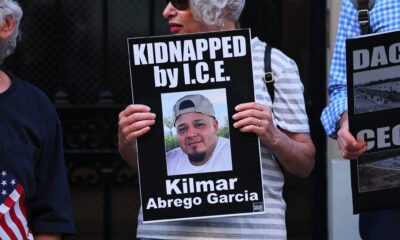border
ICE Acknowledges ‘Administrative Error’ in Controversial Deportation of Maryland Man to El Salvador Mega-Prison

The White House affirmed its decision to deport an El Salvadoran national, Kilmar Armando Abrego Garcia, despite acknowledging it as a mistake in court filings from Trump administration officials. Garcia, a resident of Beltsville, Maryland, was ordered removed in 2019 but had been granted protection from such action due to the documented risk of gang persecution in his home country.
On March 15, he was placed on one of three deportation flights to El Salvador, specifically to the Centro de Confinamiento del Terrorismo (CEBOT), described as a notorious mega-prison. U.S. Immigration and Customs Enforcement (ICE) and the Department of Justice stated that this deportation took place due to what they termed an “administrative error.” Robert L. Cerna, Acting Field Office Director for ICE Enforcement and Removal Operations, indicated that the deportation was executed in good faith, citing a final order of removal and suspected gang affiliation.
In response, Garcia’s attorney, Simon Y. Sandoval-Moshenberg, is petitioning the U.S. District Court of Maryland for a preliminary injunction that would require the government to request Garcia’s return from El Salvador. Additionally, he is moving to halt U.S. funding to El Salvador for detaining his client at the CECOT facility.
White House Press Secretary Karoline Leavitt defended the deportation, alleging that Garcia had gang ties to MS-13, despite it being labeled as a clerical mistake. She claimed the Department of Homeland Security possessed evidence supporting these assertions, including allegations of human trafficking. Sandoval-Moshenberg, however, contested these claims, noting that Garcia has no criminal record in the U.S. or El Salvador, and denied any gang affiliations.
Leavitt overlooked the immigration judge’s 2019 protective ruling, highlighting that federal law generally prevents removal if an individual faces persecution. Garcia had been regularly reporting to ICE as required since that ruling. She questioned the motivations of the immigration judge while citing the Trump administration’s determination to combat MS-13.
On a related note, 17 additional men were reportedly sent to CECOT the same week, prompting discussions about the U.S. government’s payment of $6 million to El Salvador for detaining deportees. Garcia became embroiled in this situation after being apprehended near Baltimore while driving with his son on March 12.
His wife, Jennifer Vasquez Sura, was compelled to arrive urgently to collect their son or risk having him taken into Child Protective Services. Despite informed attempts to contest the deportation, her pleas were ignored, and Garcia was quickly flown to El Salvador, about which a temporary restraining order had been issued by a D.C. district court.
Following the hearing, department attorneys representing the Trump administration argued that Maryland’s court lacked jurisdiction due to Garcia’s removal from U.S. custody and emphasized that his attorney had not proven that his life would be in danger upon return. They contended that the risk of torture or death in CECOT had not been adequately established. Furthermore, they suggested that the U.S. government would not have proceeded with his deportation if it had believed such actions would violate international obligations against torture.


















